Overview
The article addresses the common challenges faced when evaluating franchise opportunities, emphasizing the importance of a systematic assessment of factors such as business models, personal suitability, and thorough research. It supports this by detailing pitfalls like superficial reviews of Franchise Disclosure Documents and the necessity of engaging with current franchisees, alongside highlighting how informed decision-making can significantly enhance the likelihood of success in the franchising landscape.
Introduction
Navigating the world of franchise opportunities can be both exciting and overwhelming for those considering a career transition. As individuals explore this avenue, understanding the intricacies of the franchise model becomes crucial. From single-unit to multi-unit franchises, each option carries unique implications regarding investment, commitment, and potential returns.
By evaluating personal strengths and aligning them with the operational needs of a franchise, aspiring franchisees can set themselves up for success. However, the journey does not end there; awareness of industry trends, financial implications, and the level of support from franchisors plays a significant role in determining the viability of a franchise investment.
This article delves into the essential considerations for evaluating franchise opportunities, common pitfalls to avoid, and the importance of thorough research and due diligence, equipping readers with the insights needed to make informed decisions in their entrepreneurial pursuits.
Key Considerations for Evaluating Franchise Opportunities
When considering your career change, particularly in relation to the challenges in evaluating franchise opportunities, a systematic assessment of several essential factors is crucial. Comprehending the business model is essential—whether it’s a single-unit, multi-unit, or area development operation. Each structure presents distinct implications regarding time commitment, initial investment, and earning potential.
For instance, single-unit operations may attract those seeking a less intensive involvement, while multi-unit ventures often demand a more substantial commitment but can yield greater returns.
Next, assess your personal suitability. Reflecting on your skills, interests, and lifestyle is crucial, as successful operators typically align their strengths with the business’s operational needs. Just as Martha Matilda Harper, a pioneer of the modern business model, demonstrated with her convenience store operation in 1891, finding the right fit is fundamental to success.
Business operations depend on a proven system that can help you navigate the challenges in evaluating franchise opportunities, providing a structured route to success. Furthermore, keeping up-to-date with industry trends and market demand for the business’s product or service can help address the challenges in evaluating franchise opportunities, which greatly impacts your success rate in today’s competitive environment. The global business sector is projected to grow at a compounded annual growth rate of nearly 10% through 2027, indicating robust opportunities.
With 79% of consumers believing that user-generated content significantly influences purchasing decisions, the importance of consumer engagement in business success cannot be overstated. Furthermore, statistics indicate that franchised entities typically possess higher survival rates than independent businesses, rendering this business model an appealing choice. For example, 73% of consumers prefer product reviews in their native language, underscoring the necessity for localized content strategies.
Franchises that tailor their marketing efforts to meet these preferences not only improve customer engagement but also enhance sales performance. By considering these factors, including the proven systems they offer, you can better position yourself for success in a thriving market, whether you choose to stay in Corporate America, start your own business, or invest in a franchise.
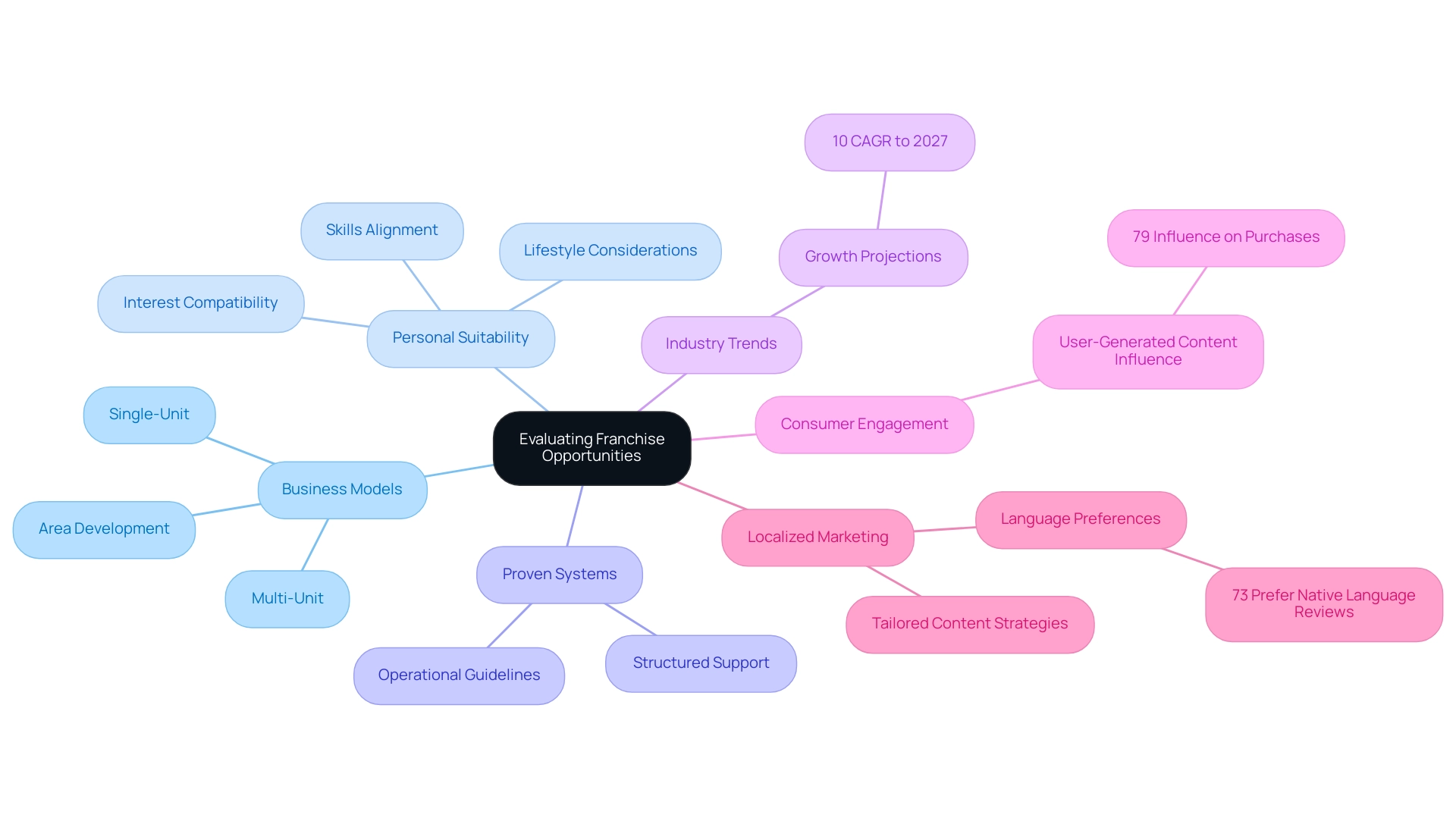
Common Pitfalls in Franchise Evaluation
As potential business partners embark on the evaluation journey, they often encounter challenges in evaluating franchise opportunities that can hinder their chances of success. One of the most significant mistakes is a superficial review of the Franchise Disclosure Document (FDD). This document is essential as it contains crucial information about fees, obligations, and financial performance metrics that are vital for making informed decisions.
Neglecting to engage with current and former franchisees also proves detrimental. Their firsthand experiences can illuminate the day-to-day realities of operating the business, offering insights that the FDD alone may not convey. Furthermore, many aspiring franchise owners underestimate the importance of understanding their local market and competition.
This oversight can lead to unrealistic profitability expectations, which may ultimately jeopardize their investment. A staggering statistic reveals that many franchisees fail to maintain separate business and personal accounts, complicating the tracking of expenses and profits. This poor money management can lead to overspending, debt, and potential bankruptcy, as highlighted in a case study that underscores the importance of regular planning and budgeting.
As Elena Lara Molina, a seasoned franchisee, aptly puts it,
Nunca olvidar que antes de ser trabajadores son personas.
Identifying the challenges in evaluating franchise opportunities and pursuing expert help—such as monetary advisors or business consultants—can enable you to manage the intricacies of ownership more efficiently, ultimately resulting in a more favorable venture.
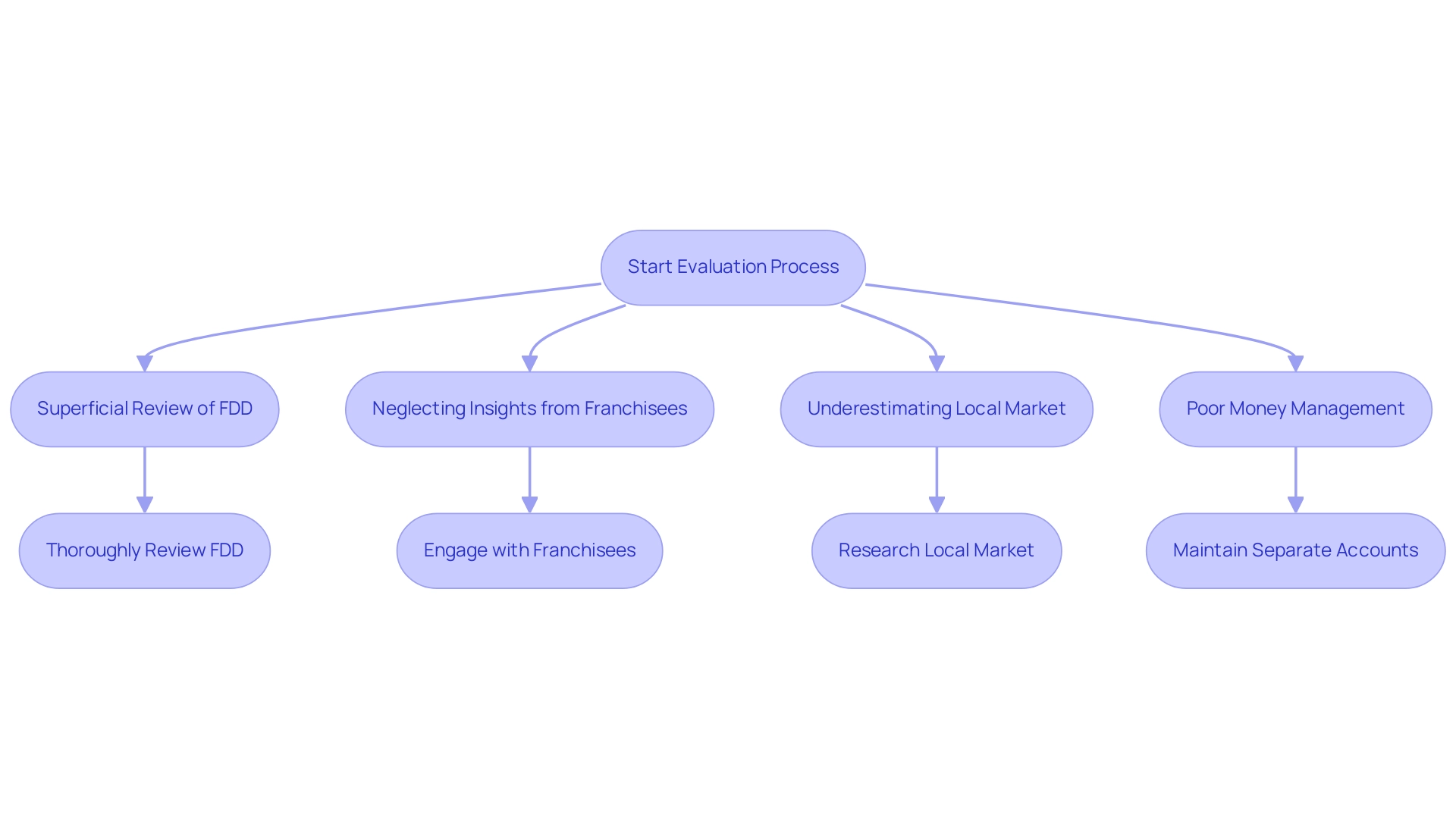
Understanding Financial Implications of Franchise Investments
Understanding the financial consequences of challenges in evaluating franchise opportunities is crucial for making informed decisions. The key components include:
- Average initial franchise fees, which can range from $10,000 to over $100,000 depending on the industry.
- Ongoing royalty rates that typically vary between 5% to 10% of gross sales.
- Supplementary costs such as marketing fees and equipment purchases.
In fact, a significant 79% of consumers believe that user-generated content plays a crucial role in their purchasing decisions, underscoring the importance of effective marketing strategies in maximizing revenue potential.
It is advisable to calculate the total investment required, which includes these fees, and compare it against projected revenue streams to mitigate the challenges in evaluating franchise opportunities and ensure financial viability. Moreover, consider the return on investment (ROI) timeline—assessing how long it may take to recover your initial investment is essential when facing the challenges in evaluating franchise opportunities. As the SBA aptly advises, when considering a business opportunity, tally the prospective marketing fees and inquire with current business owners about their satisfaction regarding value received.
For example, according to Entrepreneur, the leading five businesses in 2024, including Taco Bell and Jersey Mike’s Subs, showcase the potential profitability in the food sector, which consists of 24 of the top 50 establishments. A comprehensive understanding of these financial aspects will enable you to ascertain whether the business aligns with your financial capabilities and expectations, ultimately guiding you toward a successful entrepreneurial venture.
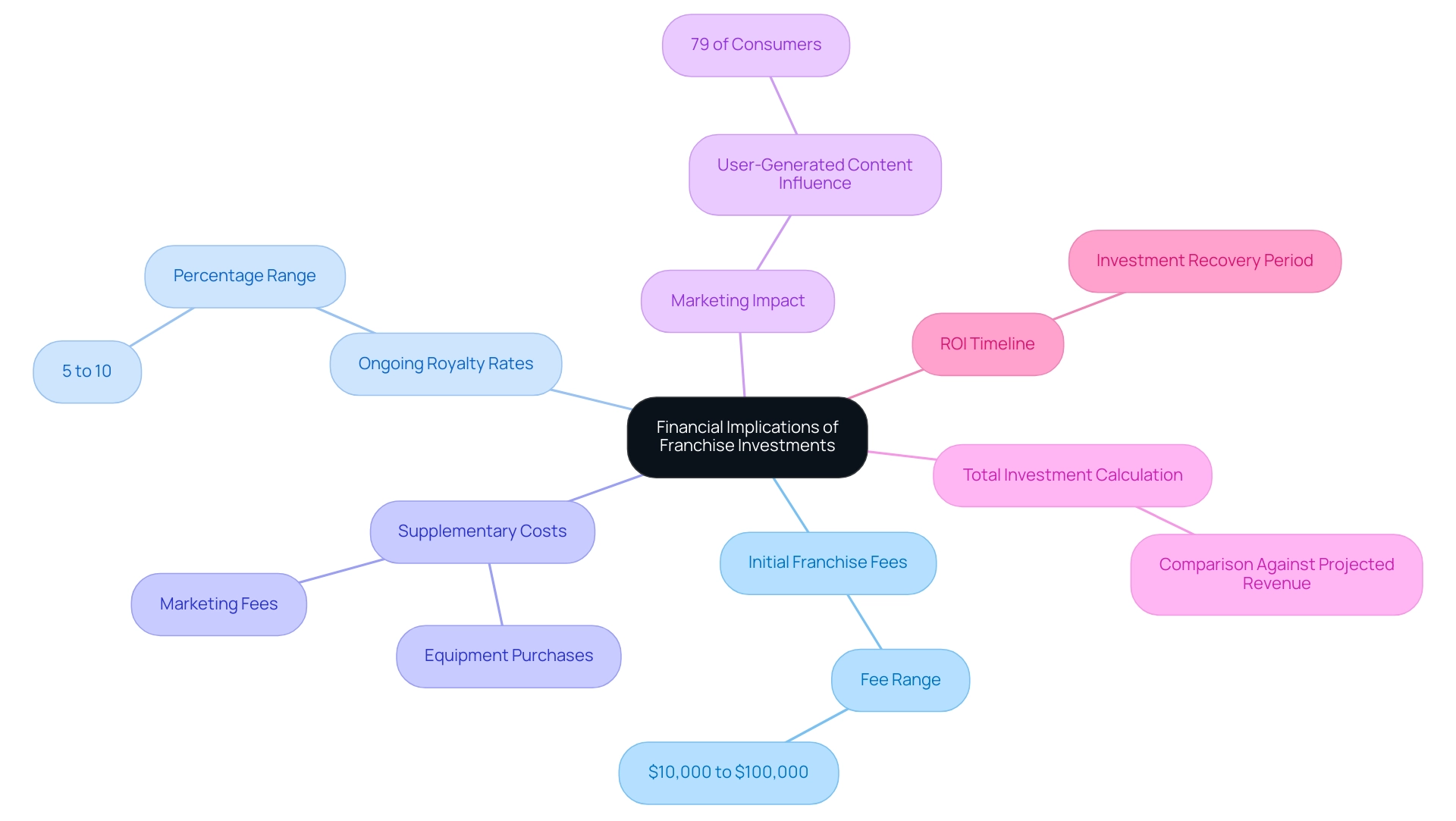
The Role of Franchisor Support and Training in Success
The extent of support and training provided by a franchisor is a crucial determinant of success for franchisees. It’s essential to thoroughly evaluate the training programs available—do they encompass key operational procedures, effective marketing strategies, and exemplary customer service practices? Furthermore, consider the ongoing support mechanisms in place, such as access to a dedicated representative or a responsive support hotline.
A robust support system not only aids in overcoming the initial hurdles of launching a business but also plays a pivotal role in fostering long-term growth and prosperity. According to the British Franchise Association, franchising has maintained stable growth even during significant economic downturns, underscoring the resilience of this business model and the importance of solid franchisor support. Additionally, businesses that implement effective training programs can significantly enhance customer trust, as evidenced by case studies where localized content strategies have proven effective—statistics show that 73% of consumers prefer product reviews in their language, directly linking localized content to improved sales.
Moreover, 79% of people believe user-generated content significantly influences their purchasing decisions, highlighting the critical role of effective training in shaping these perceptions. Ultimately, understanding the franchisor’s commitment to your success is an essential element of your evaluation process and can help you navigate the challenges in evaluating franchise opportunities, greatly influencing your trajectory as a franchisee.
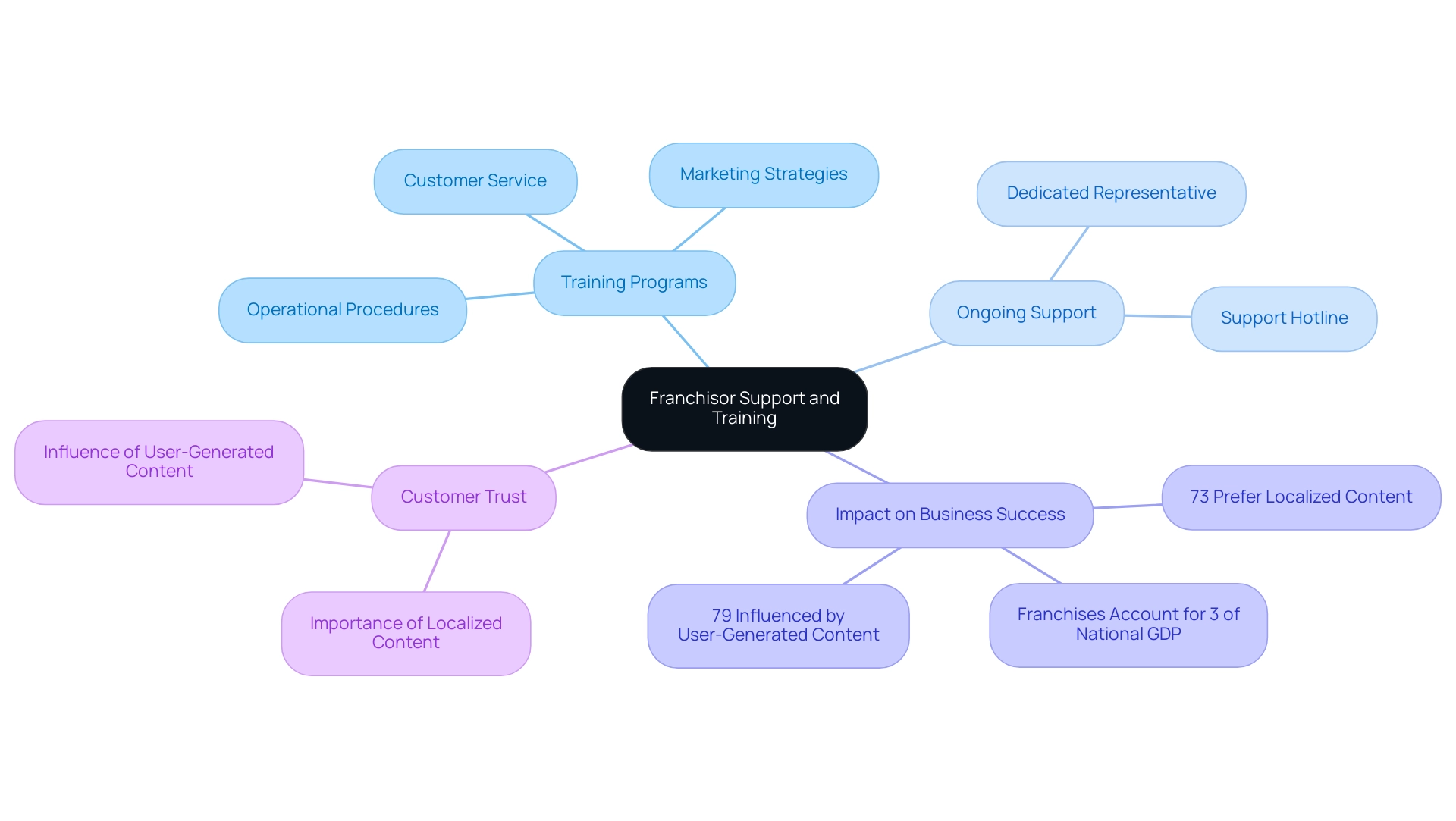
The Importance of Research and Due Diligence in Franchise Selection
When choosing a business opportunity, conducting thorough research and due diligence is not just advisable—it’s essential. As discussed in episode 215 of the Your Career Revolution Podcast, one must begin by examining the business’s history and reputation within the market. This includes seeking out reviews and testimonials from current franchisees to understand their experiences; such user-generated content is crucial, as studies indicate that 79% of individuals feel these insights significantly influence their purchasing decisions.
Evaluate how the business measures up against its competitors by analyzing performance metrics and benchmarks. This strategy not only clarifies your entrepreneurial goals but also helps you identify potential challenges in the market. Engaging with the competitive landscape allows you to see where the business stands relative to others in the industry.
The business model provides stability and growth opportunities, similar to riding a bike with training wheels, which emphasizes the importance of making an informed choice. Additionally, consider how risk management strategies, such as evaluating the support system and training programs, can mitigate challenges in evaluating franchise opportunities during your selection process. Participating in business expos is a fantastic way to connect with industry experts and gain firsthand knowledge.
Furthermore, potential franchise owners can submit their contact information to receive guidance from Franchise Advisors, providing a valuable resource in your franchise journey. By immersing yourself in this comprehensive research approach and leveraging coaching insights, you position yourself to make a well-informed decision that aligns with your entrepreneurial goals and values.
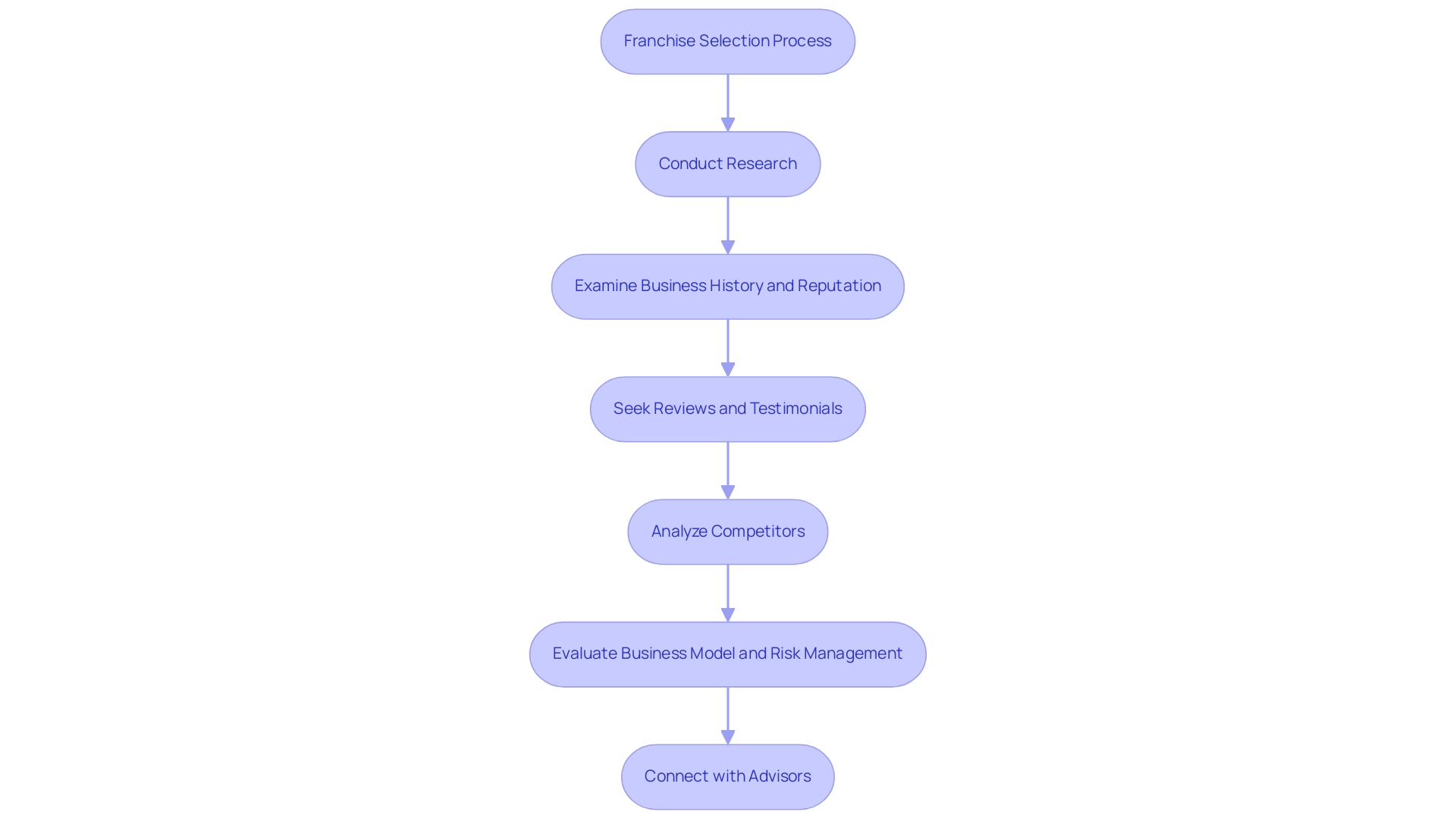
Conclusion
Navigating franchise opportunities requires careful consideration of multiple factors to ensure a successful transition into entrepreneurship. Key aspects such as:
- Understanding the various franchise models
- Assessing personal suitability
- Staying abreast of industry trends
play a vital role in making informed decisions. Recognizing the unique implications of single-unit versus multi-unit franchises, and aligning personal strengths with operational needs, can significantly enhance the likelihood of success in this competitive landscape.
Avoiding common pitfalls is equally important. Superficial reviews of the Franchise Disclosure Document (FDD), neglecting to engage with current franchisees, and underestimating local market dynamics can lead to misguided expectations and potentially jeopardize investments. Additionally, understanding the financial implications, including:
- Initial fees
- Ongoing royalties
- Overall ROI
is essential for evaluating the viability of any franchise opportunity.
The level of support and training provided by franchisors can also greatly impact success. A robust support system facilitates not only the initial setup but also long-term growth, allowing franchisees to navigate challenges more effectively. Conducting thorough research and due diligence, including examining the franchise’s history, reputation, and competitive standing, is crucial in making an informed choice.
Ultimately, aspiring franchisees must approach this journey with a comprehensive understanding of both the opportunities and challenges that lie ahead. By equipping themselves with the right knowledge, insights, and support, individuals can confidently embark on their entrepreneurial endeavors, maximizing their chances for success in the dynamic world of franchising.


